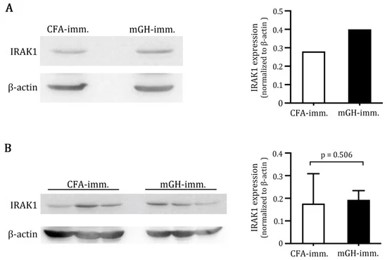楊進木教授與鄒協成副教授研究團隊發表研究成果於International Journal of Molecular Sciences
連結網址:https://www.mdpi.com/1422-0067/23/23/14958
Abstract
Autoimmune hypophysitis (AH) is an autoimmune disease of the pituitary for which the pathogenesis is incompletely known. AH is often treated with corticosteroids; however, steroids may lead to considerable side effects. Using a mouse model of AH (experimental autoimmune hypophysitis, EAH), we show that interleukin-1 receptor-associated kinase 1 (IRAK1) is upregulated in the pituitaries of mice that developed EAH. We identified rosoxacin as a specific inhibitor for IRAK1 and found it could treat EAH. Rosoxacin treatment at an early stage (day 0–13) slightly reduced disease severity, whereas treatment at a later stage (day 14–27) significantly suppressed EAH. Further investigation indicated rosoxacin reduced production of autoantigen-specific antibodies. Rosoxacin downregulated production of cytokines and chemokines that may dampen T cell differentiation or recruitment to the pituitary. Finally, rosoxacin downregulated class II major histocompatibility complex expression on antigen-presenting cells that may lead to impaired activation of autoantigen-specific T cells. These data suggest that IRAK1 may play a pathogenic role in AH and that rosoxacin may be an effective drug for AH and other inflammatory diseases involving IRAK1 dysregulation.

